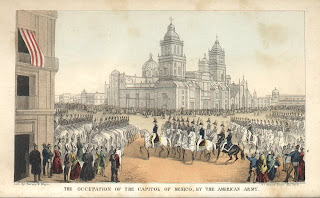
The Occupation of the Capital of Mexico by the American Army
The Mexican War of 1846-48, aka, la Guerra de Estados Unidos a México, la Guerra Mexicano-estadounidense, was a critical event on the road to the Civil War. The seizure of large amounts of Mexican territory by the United States immediately created a political battle over slavery, which eventually culminated in the Compromise of 1850. From that point onward until the 1860 election, Southern partisans gained progressively stronger control in the Executive Branch and insisted more and more intensely on imposing proslavery policies on the free states, most notoriously with the Fugitive Slave Law of 1850 and the Dred Scott decision banning Congress from restricting slavery in American territories.
Slavery was a critical issue in the Mexican War, as well, as it also was in Texas' declaration of independence from Mexico in 1836.
The war with Mexico and the acquisition of Texas, California and the other territories acquired through that war were also part of a larger policy of Manifest Destiny. The politics of slavery came to predominate in considerations of territorial expansion. Yet it's important to consider that there were national security considerations involved in addition to the politics of slavery.
This is where my perspective differs from some left and "anti-imperialist" histories of the period that treat Manifest Destiny as expansion driven overwhelmingly by internal economic interests and downplay the international environment at the time.
Spain had been largely neutralized as a New World imperial power by the Napoleonic Wars and the Latin American independence movements of the first three decades of the 19th century. But Britain was very much alive and well as a colonial power, still present in Canada and aspiring to acquire Calfornia from Mexico in the 1840s. France's New World ambitions extended to inserting the Habsburg Maximilian I (Maximiliano I) as Emperor of Mexico in collusion with wealthy Mexican conservatives as late as the 1860s. Russia had made serious though small attempts to colonize California. Even Argentina had tried to do so!
American democracy in its 1840s form, which accepted chattel slavery on a large part of its territory, banned women from voting and still had property restrictions on voting in some cases, was hardly what we think of today as a model democracy. But, hopefully without pandering to any notion of American exceptionalism, American democracy particularly as it existed in the free states was arguably the most advanced democracy in the world at that time, though Britain could certainly make a credibile claim to that position in the 1840s.
But despite the notion that President Bush today takes as a truism that democracies don't go to war with each other, Britain did invade the United States during the War of 1812 and was preparing to go to war again over the Oregon controversy in 1845. (Exactly when Britain could be classified as a democracy is subject to discussion, but they obviously had parliamentary institutions.) American leaders and the general public were on solid ground in assuming that American national security in the broadest sense was incompatable with a continental stronghold of a European empire on the North American continent. Even during the Civil War, the differences in Northern opinion on the French-backed regime of Maximiliano I was not over whether it against America's interest to allow that arrangement to persist. It was over whether it was wise to try to apply military pressure against France in the middle of the American Civil War or to wait until it was over to drive them out of Mexico.
I wouldn't suggest that President Polk was pure of heart in his ambitions to acquiring Oregon, California, Texas and other southwestern territory. But there were sound strategic reasons for doing so.
Someday, I hope to see a credible case made that there was a possibility of a "happy ending" to the conflict between the United States and the native Indian tribes that populated the course of Manifest Destiny. I have some ideas along those lines. But my point here is that for the US, occupying the breadth of the North American continent was not a choice between doing so or simply leaving the territory to the Indians. If the US had developed such strong scruples on the matter that the country stopped its expansion before acquiring Texas in 1845, neither the French, the British, the Spanish, the Russian, nor the Mexicans (or even the Argentines!) regarded themselves as bound by such scruples.
Some European or European-derived empire was going to acquire those territories. The US understandably saw it as being in the national interest to be the acquirer. That some of those interests were commercial doesn't diminish the point. And, cynically as the notion is used now and was often used then, there is actually a strong argument to be made that the progress of democracy in the world was advanced by the US being the acquirer of those areas.
There's just no reason to pretend that it was all a grand, noble, benevolent process. It wasn't.
Tags: confederate heritage month 2008, guerra de estados unidos a méxico, guerra mexicano-estadounidense, manifest destiny
No comments:
Post a Comment